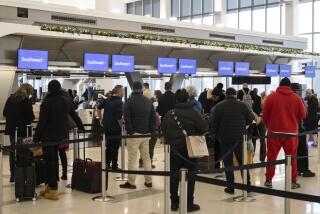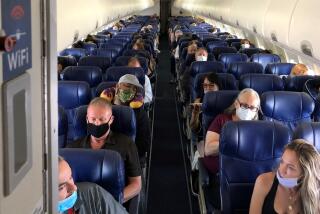Airlines Privately Back Smoking Ban
- Share via
When it comes to smoking on commercial jetliners, some airline executives apparently have two points of view--one public, one private.
On the record, most of the airline officials and spokesmen contacted Friday said that they had “no official position” about the U.S. Senate’s vote on Thursday to ban smoking on all flights scheduled for 90 minutes or less.
Their lobbying agency, the Air Transport Assn., said it is opposed to such legislation.
But off the record, several airline and industry officials said that they would like to see a total smoking ban on all flights, anywhere, of any duration.
“There’s the safety factor--fires, things like that,” one airline official said privately. “There’s the health factor. There’s the maintenance factor--the damned goop gums up the vents and ducts, and you have to clean them all the time.”
“Flight crews may start making an issue about the environmental effect at some point,” another airline official said. “We want to protect their health.
“As for safety,” the official said, the Federal Aviation Administration “has experimented with flammability standards, and it really hasn’t gotten that far. The idea (of a total ban on smoking) really makes a lot of sense.”
Another industry spokesman explained that the reason he and his associates do not support the ban publicly “is because 30% of our customers are smokers, and we don’t want to lose them.”
Burden of Enforcement
The Senate bill, if signed into law by President Reagan, would effectively snuff out smoking on about 70% of domestic flights. The bill would require the Department of Transportation--and thus, presumably, the airlines themselves--to enforce the ban, with fines of up to $1,000 for those caught smoking and up to $2,000 for anyone caught tampering with a smoke detector.
The measure is a watered-down version of a bill approved by the House last July that would ban smoking on flights of less than two hours. The House bill puts the burden of enforcement on the airport operators.
Differences between the two bills must be hammered out before the legislation can be presented to the White House. President Reagan, expressing reservations that include concerns over a lack of “empirical evidence” that smoking is harmful, has indicated that he may not sign the measure.
The federal legislation would reinforce a California law enacted in late September that bans smoking on all flights that begin and end within California. That law has been contested by the airline industry, which contends that only the federal government can regulate airlines.
Does Not Favor Ban
On Friday, the Air Transport Assn. said it does not favor “the sort of ban contemplated in the legislation.”
ATA spokesman Steve Hayes said the industry lobbying group favors “existing law,” under which each passenger compartment is divided by row into sections for those who do and do not smoke.
“The system works pretty well the way it’s set up now,” said Margie Craig, a spokeswoman in San Diego for Pacific Southwest Airlines, which is believed to handle more flights of less than 90 minutes’ duration than any other airline operating in Southern California.
“Frankly,” she said, “we don’t think the legislation is necessary.”
“We think the marketplace should decide whether there’s a demand for a smoking section within an airplane,” said Jim Brown, a spokesman for American Airlines in Dallas. “We don’t want that option taken away.”
However, another airline spokesman, speaking privately, said he thought that “the whole industry would be delighted” if a total smoking ban were imposed by law.
“But we operate on a competitive basis, so no one wants to blink first, on their own,” he said. “Muse Air tried it on their own, and look what happened. They’re gone now.
“We’d all like to get rid of it all, but you can’t do that by yourself.”
More to Read
Sign up for Essential California
The most important California stories and recommendations in your inbox every morning.
You may occasionally receive promotional content from the Los Angeles Times.










